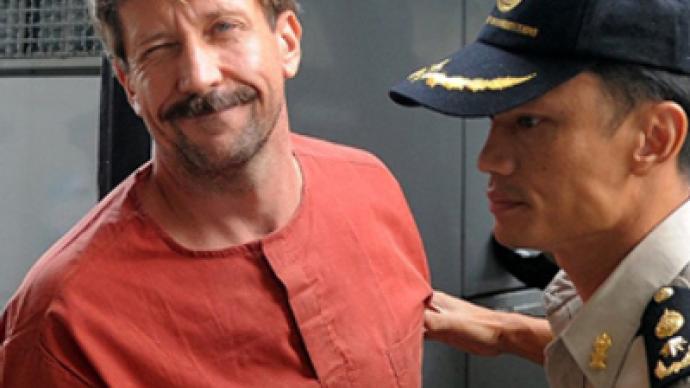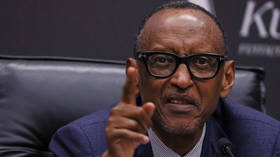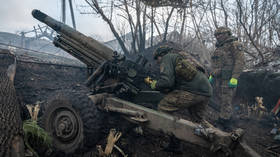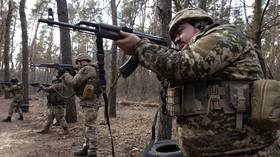Washington succumbs to another Bout of Russophobia

Following intense pressure from Washington, a Thai appeals court has decided to extradite alleged arms dealer Viktor Bout to the United States.
Viktor Bout, who has been detained in a Thai prison since March 2008 following a local and US sting operation, appeared at a Bangkok criminal court on Friday to hear whether an original court decision to release him would be upheld.“If there is no intervention to the decision of the court,” Bout replied to a reporter who asked what kind of decision he expected, “I think that the court will uphold the previous decision.”But Viktor Bout's worst nightmare has been realized.There does appear to have been excessive intervention on the part of Washington, which accuses the former Soviet air force officer of providing weapons to some of the world’s most notorious hotspots.On Friday morning, the Bangkok criminal court rejected a previous decision by Thailand’s lower court, thereby sealing Bout’s extradition to the United States, where his ability to receive a fair trial, it is feared, is a practical and technical impossibility.After hugging his wife and daughter, a teary-eyed Bout was escorted back to the detention center in leg chains without providing further comment to the media. His lawyer, Lak Nittiwattanawichan, stayed behind to brief reporters outside of the courtroom.Asked if his client was disappointed by the decision, his lawyer replied, “When I look at his face, I think he has a little bit [of disappointment], he has a little bit. But I told him, the [extradition] agreement between Thailand and the United States is… signed by the representatives of both governments.”“The court is not the one who can say, ‘send him or not send him’,” Nittiwattanwichan explained.The decision to extradite Bout to the United States was met with disdain and disbelief in Russia, which said the proceedings had been tainted by political manipulation.“We regret the political decision made by the Thai Court of Appeals,” Sergey Lavrov, Russian Foreign Minister, told reporters in the Armenian capital of Yerevan. “In my opinion, this verdict is unlawful. The information available to us confirms that this decision was made under very heavy pressure from abroad. This is sad.”Lavrov then affirmed that Russia was still committed to doing everything possible to return Bout to his homeland.“As for the interests of this Russian citizen,” the Foreign Minister said, “we have been supporting him all these months, keeping in touch with his lawyers and his family. I assure you that we will continue doing everything we can to secure his return to Russia.”Following Friday’s verdict, Thai Ambassador to Moscow Chalermpol Thanchitt was summoned to Russia’s Foreign Ministry where he was notified of Moscow’s “extreme disappointment” over the court’s ruling.“The utmost discontent and concern were declared over the politically–motivated verdict of the Thai Appeals Court, which contradicts the Thai Criminal Court's ruling made in August 2009 that denied the US extradition request due to a lack of evidence,” the Foreign Ministry’s statement reads as cited by RIA Novosti.At the meeting with Russian Deputy Foreign Minister Aleksey Borodavkin, the Thai diplomat promised to inform his country’s government of Russia's position on the issue.The Thai ruling marks the latest setback in US-Russian relations, which are striving to achieve a “reset” promised by US President Barack Obama [In June, US authorities rounded up 10 individuals and charged them with “acting as an agent of a foreign government without notifying the US attorney general.” The sensational scandal blew over in a matter of weeks as all of the charged returned to Russia after Moscow and Washington worked out a swap deal].After the ruling, Viktor Bout’s wife Alla reiterated the opinion of the Russian Foreign Ministry that the decision by the Thai court was politically motivated.“There was huge pressure from the American side. Because the American side… openly stated to the whole world…that they will put pressure on the Thai justice system in order to extradite my husband to the US,” she said.Bout's lawyer also called the extradition politically motivated and said he would “keep fighting.”The ruling has been hailed in Washington as a victory for the Obama administration, which said on Thursday it had summoned the Thai ambassador in Washington this week so that US officials could “emphasize that this is of the highest priority to the United States,” according to State Department spokesman P.J. Crowley, as reported by the Associated Press.The court ordered Bout's extradition to the United States within three months, overturning a lower court's ruling that was handed down in August 2009.
“Merchant of Death” or risk-taking businessman?
Viktor Bout has acquired a notorious reputation in the United States as one of the world's most prolific arms dealers, whose life is said to have been the inspiration behind the Hollywood film “Lord of War,” which starred Nicolas Cage.In a past interview with RT’s Spotlight program, Bout laughed off any parallels between himself and Cage’s character.“I feel very sorry for Nicolas Cage who went to play this movie. It’s very silly. This movie is bad and I feel pity for him,” America's wanted man said.But the problem goes beyond yet another tasteless Hollywood film. The problem boils down to the question of how Viktor Bout is expected to receive a fair trial in a place that was making movies surrounding his perceived persona long before any trial had taken place. Quite simply, there is not a place in the United States where Mr. Bout can expect to receive a fair, unbiased hearing. In the American mind, Viktor Bout’s guilt is sealed. After all, who would dare question the authority of Hollywood?“You have to be a Houdini, a magician multiplied by factor of ten million to actually have a fair trial, a fair shake,” Daniel Estulin, the investigative journalist who is working on a book about the “conspiracy” against Viktor Bout, told RT in an interview. “It's not about the truth; it's about getting a guy, a patsy, to go to prison, so America could feel safe and feel good about themselves, about being the beacon of truth and hope. And that's what it is all about.”At the same time, Viktor Bout’s legal team, should the extradition to the US get the green light as planned, will have to contend with the charges that their client was aiding and abetting terrorists. In these post-9/11 days, few charges against a person could be more destructive to an individual’s reputation than being labeled as an accomplice to terrorism.Following the sting operation in Thailand that led to Bout’s arrest and two-year legal battle to prove his innocence, US Attorney Michael J. Garcia told reporters that Viktor Bout “was apprehended in the final stages of arranging the sale of millions of dollars of high-powered weapons to people he believed represented a known terrorist organization, the FARC.”But the original decision by Thailand’s lower court rejected the US argument that FARC, which stands for The Revolutionary Armed Forces of Colombia, was a terrorist organization, calling it instead a “political movement.” It was on the basis of that decision that the lower court sided with Viktor Bout, who, the court argued, did not sell arms to a terrorist organization.Despite the court ruling in his favor, Bout was not released from Thailand’s notoriously tough prison, rightly dubbed “The Bangkok Hilton”. On the contrary, US authorities stepped up the pressure on Thai officials and filed new charges against the Russian.According to an article by CNN [“US files new charges against arms dealer Viktor Bout,” Feb. 17, 2010], it was reported that “Viktor Bout has been indicted by federal authorities on a series of new charges, including counts of illegally purchasing US cargo planes to ferry weapons to warring parties and regimes in Africa and the Middle East.”More precisely, the new US indictment charged Bout, and his alleged American co-conspirator, Richard Chichakli, with the illegal purchase of a Boeing 727 and a Boeing 737, as well as money laundering and wire fraud.Bout denied any involvement in illegal activities, maintaining all along that he ran a legitimate trade business.Brian Johnson-Thomas, former UN arms inspector, downplayed Bout’s arms-dealing credential when he told RT in an interview that “flying arms… is not illegal.”“Viktor ran quite a large airline operation in Africa,” Johnson-Thomas acknowledged. “And I would think that 95 per cent of his flights [consisted of] normal commercial goods. So we’re talking about maybe 5 per cent of the cargos possibly being arms. But flying arms is not in itself illegal.”Now it seems that decision will be for the US judicial system to make, that is, unless Viktor Bout’s curious case ends up being heard by a secret military tribunal instead.At that point, the truth surrounding Viktor Bout’s real activities may never be known.Robert Bridge, RT













